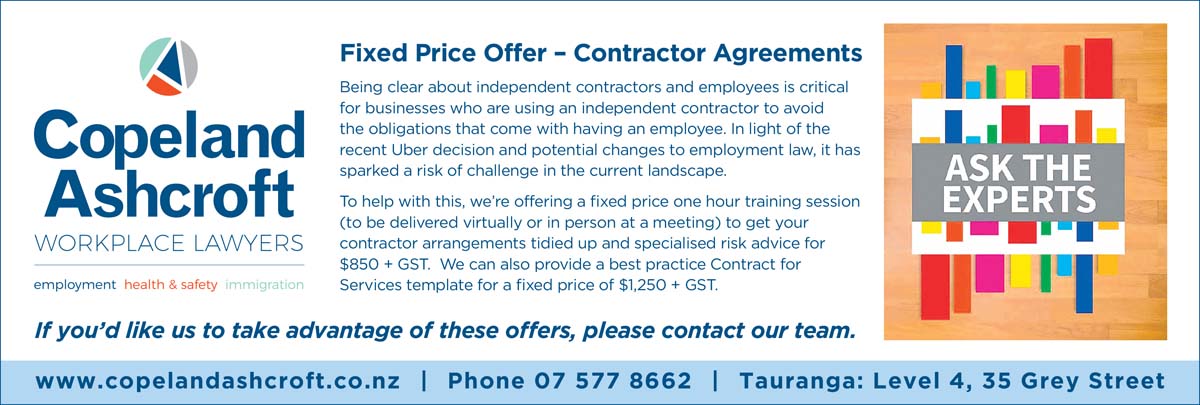
Changes in employment, immigration and health and safety law are all expected to be enacted during the coming year. However, Copeland Ashcroft Workplace Lawyers is on hand to help.
As 2024 draws to a close, we are yet to see many of the substantive changes to employment, health and safety or immigration law promised last year. However, the following developments are expected to come into effect during 2025.
Employment law
In September, the Minister for Workplace Relations and Safety announced that an exposure draft of a bill to reform the Holidays Act 2003 would be released for consultation. The exposure draft is said to include:
- Pro-rating of sick leave, proportional to hours of work. This means that an employee who works 30 hours a week could be entitled to seven and a half sick days a year, while fulltime employees receive the usual 10 days.
- Moving from an ‘entitlement system’ to an ‘accrual system’ for annual holiday entitlements.
- More simple methodology for calculating leave without having to rely on data on an employee’s daily hours of work.
- Introducing objective criteria for using ‘pay-as-you-go’ annual holidays and an easier review process.
- Clarifying that only full pay periods are to be included in a proposed new 13-week reference period when quantifying average weekly pay for annual holiday calculations.
The exposure draft is currently in the targeted consultation stage and we anticipate hearing back from the minister in 2025.
Employee or contractor?
The government proposes to introduce a test where, if satisfied, a contractor arrangement will be upheld. The Minister for Workplace Relations and Safety, Brooke van Velden, said:
“This new approach will provide businesses with more certainty to proceed with innovative business models, involving contractors where this is appropriate, and also enable businesses to offer better terms and conditions to their contractors with less concern that it might impact the contractor’s status.”
These changes are predicted to be introduced in 2025. For more information, please visit www.copelandashcroft.co.nz/law-change-on-contractor-vs-employee.
Health and safety
Consultation is well underway on the Health and Safety at Work Act (HSWA) 2015 review and reform. This follows criticism from MBIE, describing current health and safety laws as: “an outdated and incomplete regulatory framework.”
MBIE has previously highlighted the need for reform in areas where workers operate machinery, use equipment or work at heights, which account for almost 80 per cent of New Zealand’s work-related deaths, roughly double the rate in Australia. The Business Leaders’ Health and Safety Forum estimates the cost of workplace illness and injury in New Zealand at $4.9 billion per year.
The New Zealand Institute of Safety Management has responded positively to the reform, proposing three recommendations: better system leadership and coordination, improving and investing in WorkSafe and better regulations and guidance.
The institute states there is a “complex and dysfunctional set of funding mechanisms, roles and policy functions between MBIE, ACC and WorkSafe,” which has prevented implementation of health and safety strategies.
While consultation regarding the HSWA progresses into 2025, there has been a lack of focus in comments about wellbeing and mental harm to date, so it appears the focus will be on physical safety.
Immigration
Heading into 2025, we note a number of changes in immigration law:
- Maximum period of stay: a new rule has been introduced that limits the time a migrant worker can remain in New Zealand continuously on an Accredited Employer Work Visa (AEWV) to five years. For skilled roles there is a lower maximum period of stay. Migrant workers will need to meet residence visa requirements within the maximum period of stay period or they must depart for 12 months.
- Median wage: the Minister of Immigration has indicated that a move away from using the median wage will likely be implemented in 2025. While positive overall, this change may create a difficult space for employers who have already supported migrant workers for AEWVs requiring employers pay at least $29.66 per hour, for example.
- Changes in the investor migrant space: the Active Investor Policy will be changed to encourage more investment into New Zealand, the Minister of Immigration has suggested. An area in which the government may look to encourage investment is infrastructure bonds.
- Changes in the skilled residence space: the Skilled Migrant Category will be reviewed in 2025.
Stay up to date
Copeland Ashcroft Workplace Lawyers delivers specialist advice, representation and support across employment, immigration and health and safety law to businesses throughout New Zealand. We can provide advice and guidance pertaining to any of the changes mentioned above.
Visit www.copelandashcroft.co.nz to subscribe to our newsletter, gain access to our free webinars, receive invitations to our workshop and seminar series and stay up to date with the latest developments.









